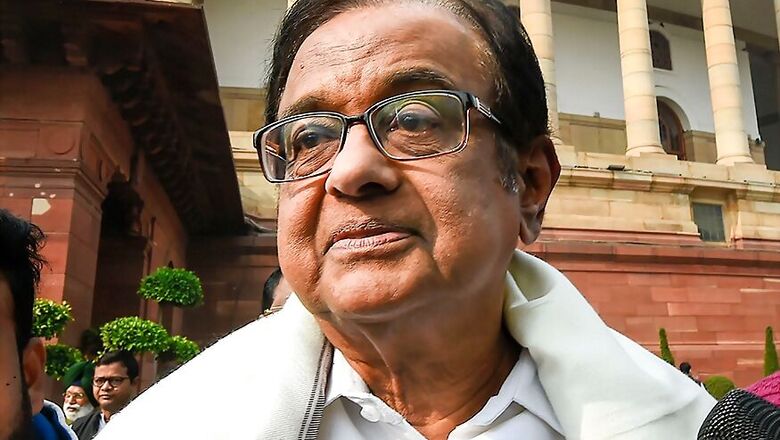
views
Chennai: Congress may oppose the proposal to list insurance behemoth Life Insurance Corporation of India if the Centre failed to convince it with rationale explanation for its move, senior party leader P Chidambaram said on Monday.
The LIC is profitable despite fierce competition from very large insurance companies of the world with deep pockets and it has also increased its first premium share last year by about five per cent, he said.
Presenting the 2020-21 budget, Finance Minister Nirmala Sitharaman on Saturday proposed to sell a part of government stake in LIC through an initial public offer next fiscal.
Participating in a Question and Answer session after his lecture on budget organised by the Southern India Chamber of Commerce and Industry here, Chidambaram, a former finance minister, said the LIC was doing well.
"They have to explain to us... why do you want to list LIC today. Is it because you think the management culture is bad ? the work culture is bad? Convince us," he said answering a query.
Further, he said: "But if the reason which the government gives is we have to collect money and therefore we want to disinvest, we will oppose it. That is a bad reason. You tell us good reasons why LIC should be listed."
The government may probably list about five or 10 per cent and it was not going to change LIC's ownership, Chidambaram said.
Also, he said the if the government was able to convince the Congress party, "may be, we will be convinced. But at the moment we are sceptical."
On the budget proposal for abolition of Dividend Distribution Tax for companies, he said his personal view was that the "DDT is an efficient tax. There is no scope for evasion in DDT. Zero evasion... somehow it acquired a bad name."
Though it was introduced by him when he was the Finance Minister, his successors including Pranab Mukherjee and Arun Jaitley stuck to the DDT, he said claiming the foreign investors lobby in Mumbai went against it.
To a question on Air India disinvestment, the former minister said he had doubts about the government successfully privatising it. "It is not easy to sell Air India. It has got too much baggage."
On state-run telecom major Bharat Sanchar Nigam Limited, he said though it has great assets like optical fibre, it has outlived its utility and it cannot compete in the present day market.
The BSNL belonged to the age of monopoly and had a different work culture, Chidambaram said. "I am not so worried about privatisation of BSNL. I want
to know how they are going to dispose of that asset. Are they going to dispose it of in a fair and transparent manner and get full value for the asset. It is a huge asset," he noted.
On the Economic Survey's (2019-20) "thalinomics," he hit out at the segment chosen for arriving at the outcome and asked how many in the audience thought that thali (food) has become cheaper.
"Nine out of ten thought thali has become cheaper. That is not what the Chief Economic Adviser (Krishnamurthy V Subramanian) said. He said thali has become more affordable and it is very different from cheaper."
What the CEA really said was the 'numerator,' the price of the thali may have gone up but the 'denominator' the disposable income for a given segment has also gone up and the food has thus become more affordable.
He said the CEA had taken regular employment in the organised sector as the sample which was wrong. It has not become cheaper and there was no reason why it should become cheaper, Chidamabram said.
In his lecture, he said the Indian economy was demand constrained and investment starved. On solutions, he favoured firing engines of growth including government expenditure.
Despite the constraint of finances, the government should have redrawn its expenditure pattern so that many of the programmes of long gestation were deferred (or allocations slashed down) and the bulk of money was given to schemes that will give money quickly to the ordinary people to help spur consumption.
The Mahatma Gandhi National Rural Employment Programme "is holding up rural India today," he said adding that was the only safety net available to the poor people and it made available money to them and they will spend it at once.
However, under the programme, in the current year, the government hoped to spend Rs 71,000 crore and in the next year they budgeted only Rs 61,500 crore.
He said Sitharaman should have allocated one lakh crore rupees for the rural employment scheme and it could have ensured money in the hands of the ordinary people immediately.
Similarly, the allocation for PM Kisan plan, "not a very strong programme but a reasonably good scheme," could have been increased, he said.
Steps like an increase in payout from Rs 6,000 to Rs 12,000 and scheme's expansion to include more beneficiaries like tenant farmers could have been done to spur consumption, he added.




















Comments
0 comment